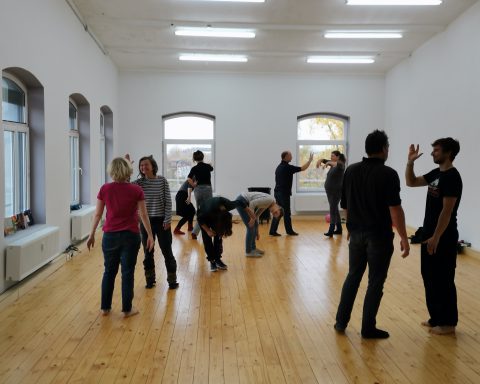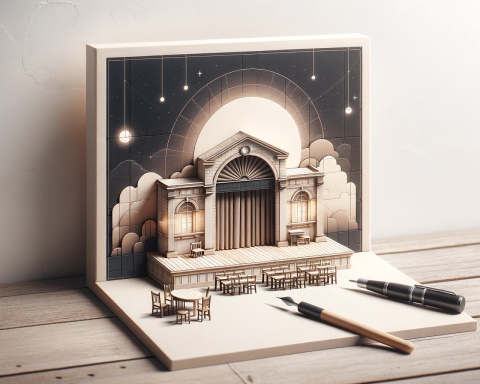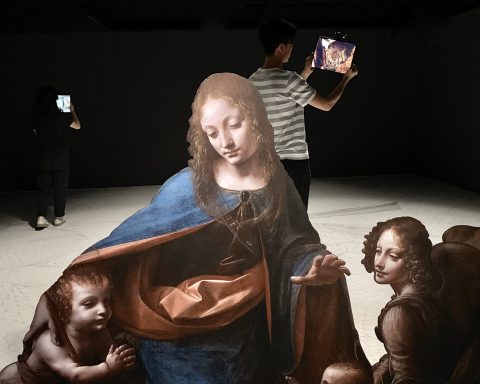During the past two years, I’ve watched a few classical plays at Leipzig’s Schauspiel: Sophocles’s Antigone, Schiller’s Kabale und Liebe and Maria Stuart, and Ibsen’s Hedda Gabler. In addition to such legendary works, the Schauspiel offers a good ensemble of actors and a large stage. University students usually pay as little as 8 euros for seats even in the best category, and as of late, for those who don’t know German, shows are simultaneously translated into English or Spanish via headphones that can be borrowed for free.
Everything could be perfect – if it wasn’t for one thing: the Leipzig Schauspiel more or less adheres to what in Germany is known as Regietheater (“director’s theater”).
This concept, which emerged in the second half of the 20th century, grants the director of a theatrical or operatic production the freedom to alter the original book according to his or her very own notions and intentions. As a result, Wagner’s Tannhäuser may be set in a biogas plant (as happened at the Bayreuth festival in 2011) or Verdi’s La Traviata on a tennis court (Cologne in the mid-2000s).
People from the Middle Ages may wear black business suits and suddenly strip naked. Or citizens of ancient Athens may be showered with several colors of paint and then collectively wallow in them. The latter, among other things, took place last Sunday, February 28, at the Schauspiel Leipzig.
The play was supposed to be Shakespeare’s A Midsummer Night’s Dream (ca. 1595/96): a comedy about the Duke of Athens, his fiancée and four other lovers, or non-lovers, from ancient Athens as well as six craftsmen rehearsing a “play in the play” for the ducal wedding. In a nearby forest, everyone gets plunged into confusion by the magic of fairies, but in the end, all three couples marry.
On the Leipzig stage, the forest was represented through a pond surrounded by high trees on a revolving disk, while somberness and spooky light effects created an exciting atmosphere around everything. Moreover, the show was accompanied by a wind ensemble of Leipzig’s Gewandhausorchester playing Mendelssohn’s beautiful “soundtrack” for A Midsummer Night’s Dream. Again, everything could have been perfect – if it wasn’t for director Philipp Preuss’s adherence to the Regietheater.
Let there be no mistake: It’s not at all my opinion that a theatre play or an opera should be performed exactly as its writer or composer would have done it, because then in A Midsummer Night’s Dream, female roles too would be played by men, and people in the audience would loudly comment on the show while watching it. Such a historical re-enactment is a nice curiosity you can see to a certain extent, if you want, in Shakespeare’s reconstructed Globe Theatre in London.
In our time, by contrast, I find that besides female actors and a silently watching audience, experiments with new technical devices such as visual projections are also appropriate.
In Leipzig’s A Midsummer Night’s Dream, actors at one point retreated from the spectators’ sight to the back of the stage; their ongoing play was filmed by a cameraperson, and projected on the semitransparent curtain that had been lowered in front of the stage. This technique added in an intriguing way to the spine-chilling atmosphere.
However, what I cannot accept are directors’ ideas that don’t add to the original book, but on the contrary mutilate or supersede it.
This goes, to start with, for the “paint” in the production, meant to be the magic potion which, in Shakespeare, the fairies pour on the lovers’ eyelids (III, 2). Why are, in Leipzig, the lovers’ whole bodies covered in paint, followed by their rather disgusting wallowing in it? The actors deserve pity also for the random, meaningless nakedness absent in Shakespeare, but at times forced on them by the director in Leipzig. Moreover, Preuss inflated the craftsmen’s rehearsal to an excruciatingly long, awkwardly-joking annoyance.
Last, and most importantly, the German translation of the text in this production was strongly abridged and adapted, so that you no longer saw the original lines of action, and no longer heard the elaborate, witty language of Shakespeare. Why all this? For the sake of the director, that must be it.
I’ve got the feeling that the entire concept of Regietheater has been invented by merciless egomaniacs: directors, and maybe also actors, who produce, or perform, plays only to showcase the “brilliance” of their personality. But whether or not he is brilliant, a director producing a play he hasn’t written himself ought to respect, to trust and to serve that work instead of making it serve the director.
That means the production must avoid everything that makes it hard for people to still identify the original work. In other words, the form may be altered, but not the content. Using a camera and projection belongs to the form; it presents content in a different way, but still presents the same content. By contrast, a strong adaptation of the text – or craftsmen from ancient Athens performing a play in gold glitter jackets – alters or contradicts the original content and therefore should exist only if the announcement of the show “warns” people what to expect.
So instead of announcing William Shakespeare’s A Midsummer Night’s Dream, the Schauspiel Leipzig should announce Philipp Preuss’s A Midsummer Night’s Dream. Then they would give me a chance to decide not to go to that show, because in comparison to Shakespeare, the “playwright” Philipp Preuss is, as me and probably you, a nobody, and my lifetime is far too limited to waste it on a nobody’s version of A Midsummer Night’s Dream. Alas, the Schauspiel did announce Shakespeare, so let me directly ask you, Mr. Preuss, what in the world gives you the right to abuse somebody else’s name for your personal bizarre fantasies?
Into the bargain, the name of somebody who is dead and therefore unable to protest? You seem to think you’re ingenious, giving to Shakespeare what he still needed. But I assure you that Shakespeare’s works were complete already without you, and this is true of all playwrights, unless they ask you to add your two cents. So when you touch their works, please respect them as they are. By contrast, if you need plays to be as you want them, just go write them yourself, and leave other authors alone!
On a final note: The person who on February 28, still during the first half of the show, left it by ostentatiously slamming the auditorium’s door wasn’t me, although I may pass the same judgment on the production.
You can see the Schauspiel version of “A Midsummer Night’s Dream” for yourself, and perhaps tell us what you think – we aim for diversity of opinion. The next dates are March 26th, April 17th and May 21st, at 7:30 p.m. You can find more info on the play’s Web site.











